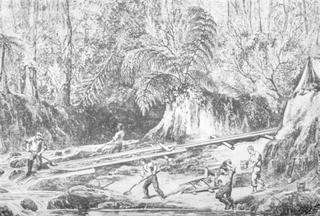 The High Court's recent decision to overturn the blanket ban on mining on the Coromandel "exposes a clash of values," said Nandor Tanczos this morning on bFM--and of course he's right. It does.
The High Court's recent decision to overturn the blanket ban on mining on the Coromandel "exposes a clash of values," said Nandor Tanczos this morning on bFM--and of course he's right. It does.There are many opposed to mining in the Coromandel, not least Thames-Coromandel District Council Mayor Philippa Barriball whose District Plan had put the ban in place. "A mining company would have to be prepared to spend $10 million before even getting to the Environment Court," she threatened after the decision. So there.
So how is such a clash of values to be played out? There are only three options, as I see it.
1) Violent conflict;
2) Politicisation of the issue--the current default position involving picketing, bickering and politicking;
3) Property rights.
Property rights takes the issue out of the political arena, and allows those who do hold rights to express their own values without political interference from the likes of Ms Barriball. Elizabeth Brubaker from Canadian organisation Environment Probe makes that case here.
When properly expressed through common law for example, property rights involve a 'bundle' of rights, and each rights-holder is promised clear legal protection by the courts over their 'stick' in the bundle. When such a thing as mining takes place or is contemplated for example, an owner of a stick in the affected bundle has absolute protection in expressing their own values--whether conservation of the environmental values, or use of the resource--and that legal protection must be recognised by anyone proposing to exercise the use of their own 'stick.'
If for example I have a clear and protected right to use or take from a stream running through an area affected by the mining, then under common law the miner is obliged to take my values into account by either not damaging the waterway, or by purchasing my assent and the assent of all other affected stream-users, and indeed all other affected parties. Elizabeth Brubaker offers some examples here of the sort of legal protection afforded to stream-users by common law, and similar legal protections exist for other rights' holders, including those who might hold rights to access, hunting, harvesting, tramping, logging, birding, or profits à prendre, who hold a conservation covenant, or who just have the right to peaceful enjoyment of their property.
That's protection then for all rights-owners' chosen values, and all done without all the picketing, bickering and politicking we see now. If it be objected that this excludes all those who value the untrammelled value of wild and untouched land, then let them express the extent to which they do truly value that land by becoming a rights-holder in it, rather than seeking to use the government's club to express them. It doesn't require full ownership, it simply means acquiring the right to a 'stick' in the bundle.
No comments:
Post a Comment